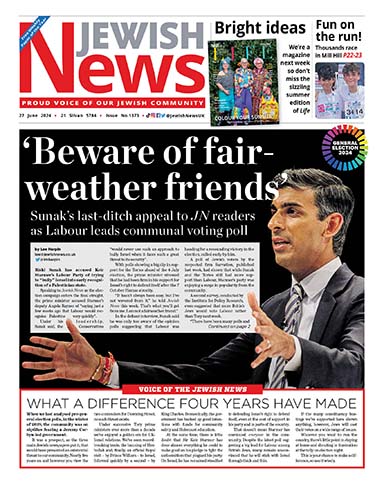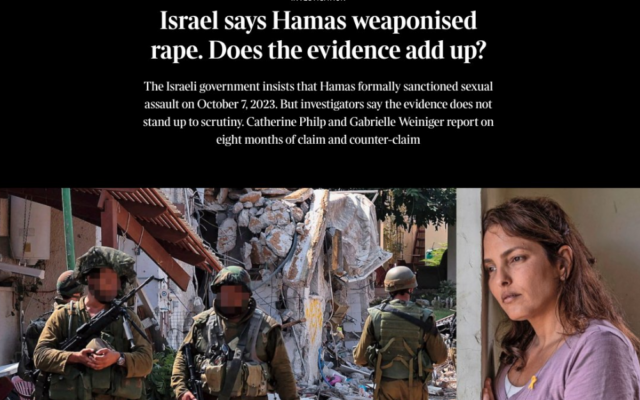‘They twisted our words’: Times newspaper faces bitter backlash over 7/10 sexual violence article
Contributors to the article that featured in last Friday's edition claim it "discredits and gaslights victims of heinous acts of sexual violence"
Two journalists who wrote an article questioning the validity of rape accusations during the atrocities of 7 October have been accused of “exploiting” those they interviewed for the piece.
On 7 June, The Times newspaper published an article by its world affairs editor Catherine Philp and journalist Gabrielle Weiniger, asking: ‘Israel says Hamas weaponised rape. Does the evidence add up?’
The piece alleges “insufficient evidence that Hamas intentionally and systematically used rape as a weapon of war”.
Referring to 7 October, it states: “Perhaps nothing arising from that day had been more contentious than Israel’s assertion that Hamas had not only burned and slaughtered its way through Israeli communities along the Gaza border, killing 1,200 and taking more than 200 hostages but that it planned and carried out a campaign of mass and systematic rape as a weapon of war.”
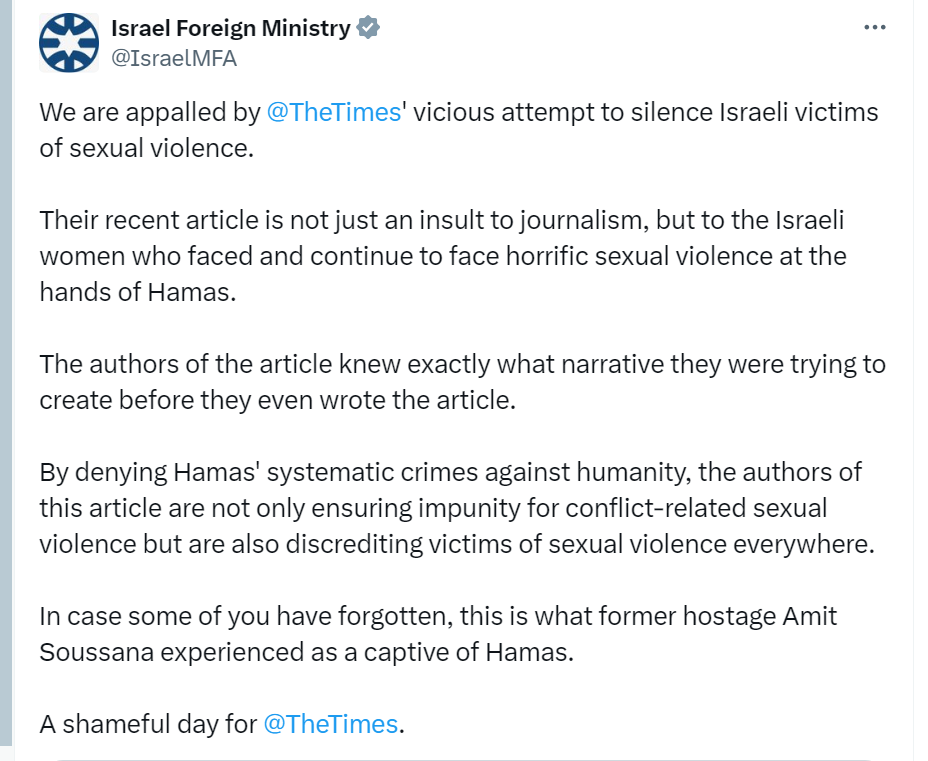
It claims for “specific survivors, the only reason they told their story was because they wanted some kind of political pressure on the Israeli government to work harder to release the hostages”.
It goes on to quote Dr Sarai Aharoni, head of the gender studies program at Ben Gurion University, saying that the collective trauma of eastern European Jews, “in which thousands of Jews were killed and Jewish women raped by Christian soldiers and antisemitic mobs” meant “historical memories” would “come to play a role in the reporting of what happened on 7 October”.

It also states: “Talk of rape began circulating almost before the massacres themselves were over” and that, according to Pramila Patten, the UN secretary-general’s special representative on sexual violence, “much of it came from “non-professionals” who supplied “inaccurate and unreliable forensic interpretations” of what they found, creating an instant but flawed narrative”.
Also criticised in the piece are the first volunteer responders from Orthodox organisation Zaka, whose reports of discovering rape victims were called into question because of their “lack of familiarity with the women’s bodies they were finding and their tendency to focus on injuries they believed pointed to sexual violence, such as smashed pelvises and gunshot wounds to sex organs, ignoring other injuries that muddied the picture”.
The report quotes Orit Sulitzeanu, executive director of Israel’s ARCCI (Association of Rape Crisis Centres ) saying: “They are all religious guys; most of them are ultra-religious. They never saw a woman except their wife” and that “Aharoni and others are struck by how closely the Zaka accounts cleaved to stories handed down about the horrors of the pogroms”.

Three main contributors to the article, who were quoted in detail, have since criticised the piece for its “cynical exploitation”.
A statement signed by Prof. Ruth Halperin-Kaddari, (former vice-president of the UN Committee on the Elimination of Discrimination Against Women (CEDAW), Dr. Sarai Aharoni, head of the Gender Studies Program, Ben Gurion University and Orit Sulitzeanu, chief executive officer of the Association of Rape Crisis Centres in Israel, was widelyshared across social media.
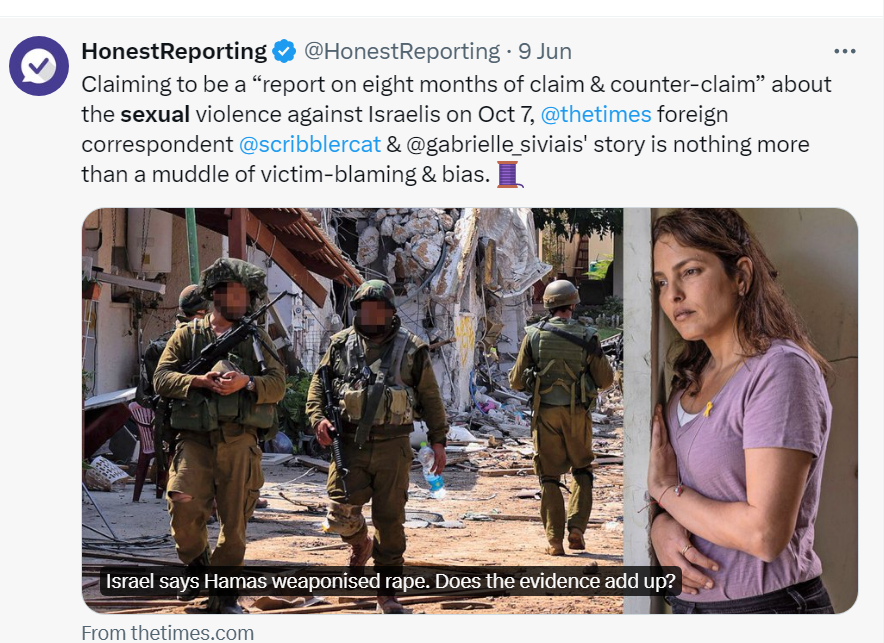
It claims the article “misrepresented our words, twisting them to convey the impression that we support the prejudiced argument that claims of sexual violence are being manipulated by Israel. The article aims to discredit and gaslight the victims of heinous acts of sexual violence. Hence, much of what we said was omitted, and only selective excerpts were used, taken out of context to serve the article’s agenda.
“We are shocked and disappointed by the exploitation of our willingness to be interviewed and the attempt to use our expertise to give credence to the reporters’ views. The article joins those who are guilty of the unacceptable politicisation of sexual violence. In this instance, the reporters’ agenda replaced the professional and ethical commitment to presenting evidence accurately.
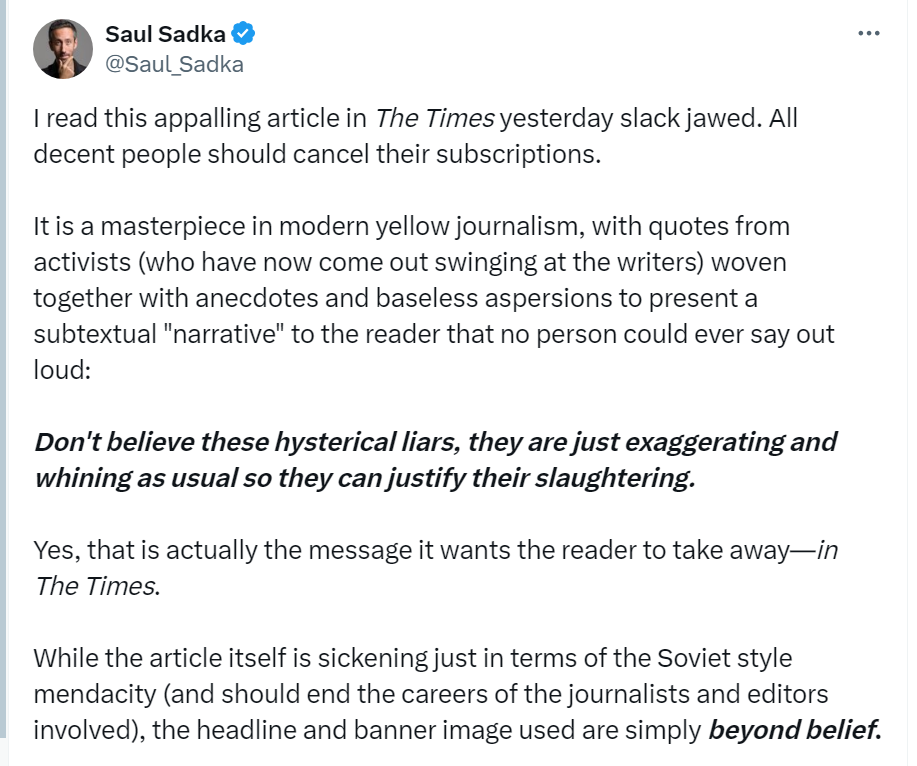
“The use of sexual violence as a weapon of war was a significant part of the October 7 attack. Denying the evidence of such violence has become a disturbing aspect of the global pro-Palestinian discourse, adversely affecting the well-being of sexual violence survivors of the massacre, as well as survivors everywhere.”
Social media comments to Weiniger and Philps have been broadly scathing and Philp has since turned off comments on her Twitter/X account.
The Israel Foreign Ministry branded the article “a vicious attempt to silence Israeli victims of sexual violence” adding it is “not just an insult to journalism, but to the Israeli women who faced and continue to face horrific sexual violence at the hands of Hamas”.
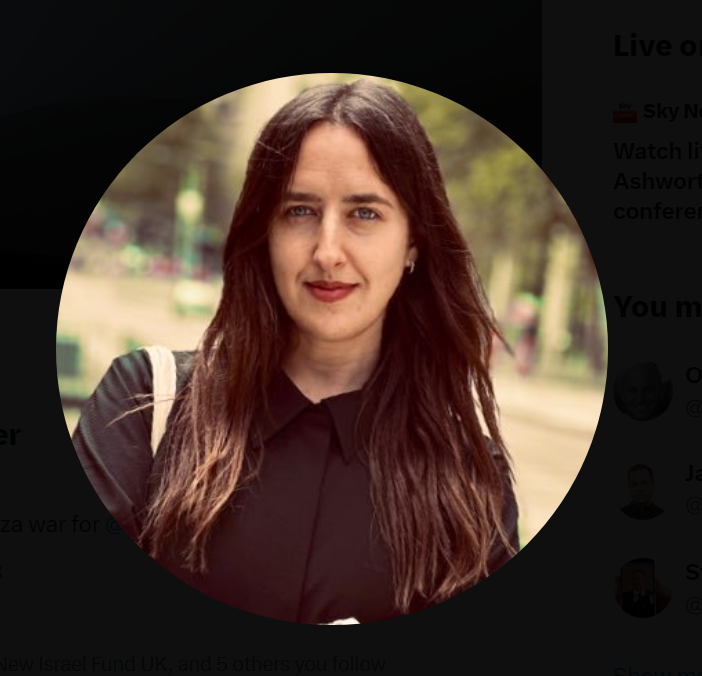
Weiniger wrote on Twitter/X that it “was an impossible piece to write, that began by looking to tell the story of 7 October rape survivors and murdered rape victims, but ending with how their stories and voices have been hijacked.”
The Times said it is “aware of a complaint about the article and is investigating”.

Thank you for helping to make Jewish News the leading source of news and opinion for the UK Jewish community. Today we're asking for your invaluable help to continue putting our community first in everything we do.
For as little as £5 a month you can help sustain the vital work we do in celebrating and standing up for Jewish life in Britain.
Jewish News holds our community together and keeps us connected. Like a synagogue, it’s where people turn to feel part of something bigger. It also proudly shows the rest of Britain the vibrancy and rich culture of modern Jewish life.
You can make a quick and easy one-off or monthly contribution of £5, £10, £20 or any other sum you’re comfortable with.
100% of your donation will help us continue celebrating our community, in all its dynamic diversity...
Engaging
Being a community platform means so much more than producing a newspaper and website. One of our proudest roles is media partnering with our invaluable charities to amplify the outstanding work they do to help us all.
Celebrating
There’s no shortage of oys in the world but Jewish News takes every opportunity to celebrate the joys too, through projects like Night of Heroes, 40 Under 40 and other compelling countdowns that make the community kvell with pride.
Pioneering
In the first collaboration between media outlets from different faiths, Jewish News worked with British Muslim TV and Church Times to produce a list of young activists leading the way on interfaith understanding.
Campaigning
Royal Mail issued a stamp honouring Holocaust hero Sir Nicholas Winton after a Jewish News campaign attracted more than 100,000 backers. Jewish Newsalso produces special editions of the paper highlighting pressing issues including mental health and Holocaust remembrance.
Easy access
In an age when news is readily accessible, Jewish News provides high-quality content free online and offline, removing any financial barriers to connecting people.
Voice of our community to wider society
The Jewish News team regularly appears on TV, radio and on the pages of the national press to comment on stories about the Jewish community. Easy access to the paper on the streets of London also means Jewish News provides an invaluable window into the community for the country at large.
We hope you agree all this is worth preserving.

